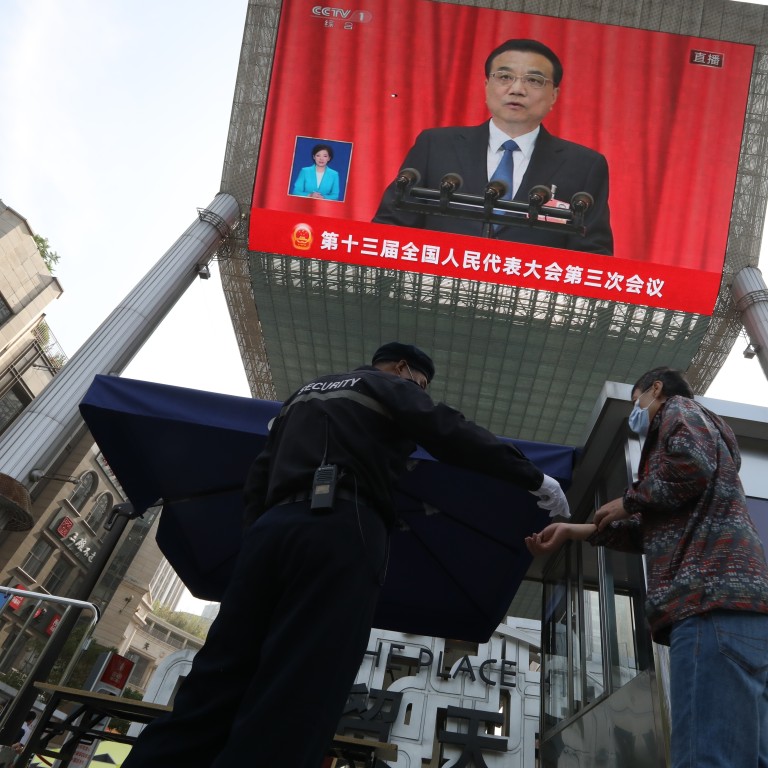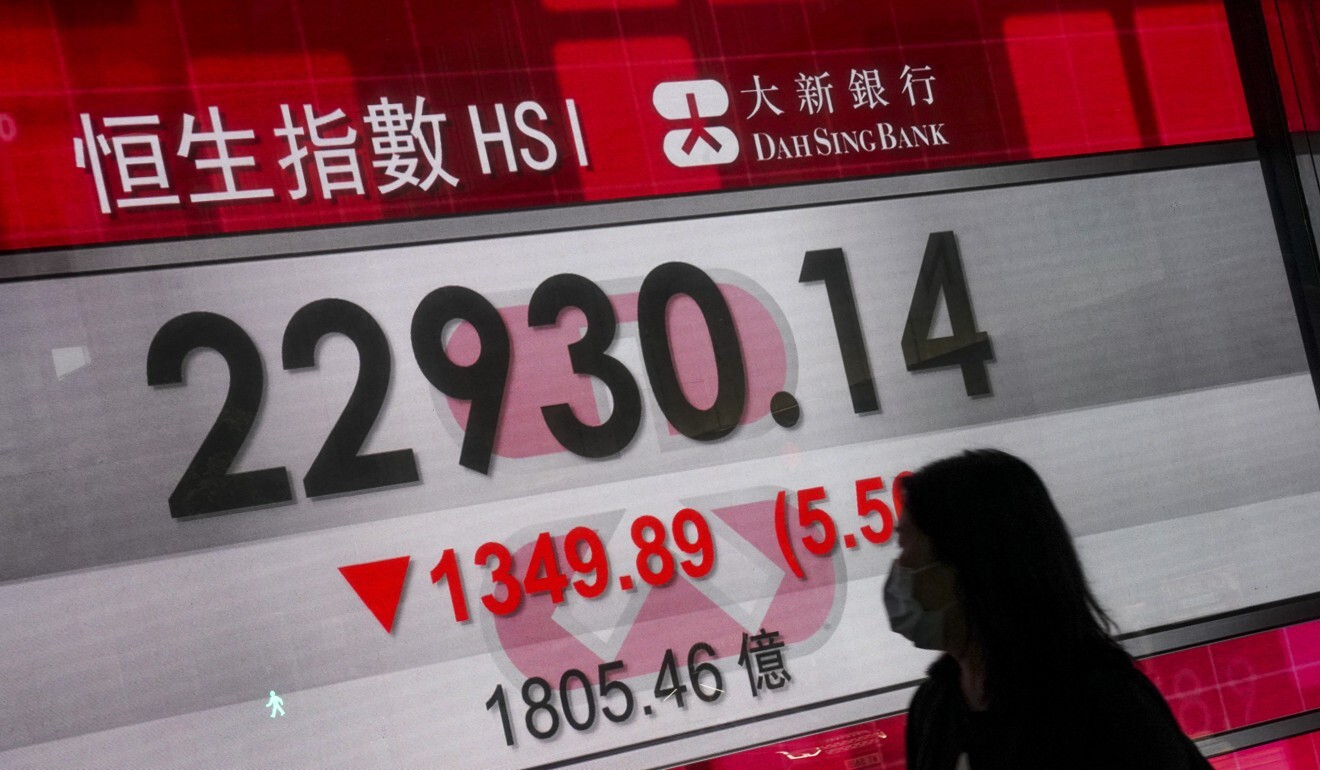
China tries to keep steady hand on wheel of economy amid coronavirus pandemic, but fires salvo at Hong Kong
- Premier Li Keqiang’s annual work report stresses need for stability, but plans for Hong Kong national security law rattle markets and prompt threat of US retaliation
- National People’s Congress delegates told that annual growth target will be scrapped for first time due to uncertainty caused by Covid-19
The work report delivered by Chinese Premier Li Keqiang to thousands of delegates at the annual National People’s Congress on Friday was shorter than usual at 20 pages, but it packed a punch that rattled stock markets, sent a shiver through Hong Kong, and drew a sharp rebuke from Washington.
The gathering in Beijing – the most important event in this year’s political calendar – began with a minute’s silence for the thousands in China who had lost their lives in the Covid-19 outbreak.
Li described the pandemic as “the fastest spreading, most extensive, and most challenging public health emergency China has encountered since the founding of the People’s Republic” in 1949.
He said that for the first time China would not set an economic growth target, citing the outbreak’s toll on the economy, national security and international relations.
Chinese government drops references to ‘peaceful’ reunification with Taiwan
“We have not set a specific target for economic growth this year,” Li said. “This is because our country will face some factors whose development is difficult to predict due to the great uncertainty regarding the Covid-19 pandemic and the world economic and trade environment.”
Li spoke to an audience including President Xi Jinping and nearly 3,000 delegates at the gathering, part of China’s “two sessions”, which had been delayed by two months because of the outbreak.
The report listed job creation as the top priority in this year’s economic to-do list and forecast a higher deficit budget of at least 3.6 per cent of GDP and tax cuts of at least 2.5 trillion yuan (US$352 billion).
It also stressed that the government would support e-commerce and the digital economy, which played an important role when millions of people were locked down at home to stop the spread of the disease.
The party-state’s main message is about control in the current crisis, said Jérôme Doyon, a lecturer with the Oxford School of Global and Area Studies and a researcher at Wolfson College.
“The lack of targets in particular can be seen as an illustration of Xi’s ‘bottom-line thinking’, which warns officials to stay cautious and alert, and be prepared for the worst scenarios,” Doyon said.
“Without a target they have, in fact, more leeway in dealing with the current crises, both the health crisis and the financial one.”
China’s economy shrank by a record 6.8 per cent in the first quarter and as Covid-19 continues to spread around the world – killing more than 335,000 people and infecting in excess of 5 million – the global economy has entered into a deep recession.
Hans Hendrischke, professor of Chinese business and management at the University of Sydney Business School, said the economic measures would be“absolutely critical” for the private sector.
But he said the report fell short of bold moves on reform and attracting foreign investment, adding: “People were hoping that China would come out with some radical measures.”
China GDP: Beijing abandons 2020 economic growth target, Premier Li Keqiang confirms at NPC
The report was also short on references to the growing tension with the United States, with only a brief comment that it would implement the phase one trade deal with the US.
Chen Long, a partner with Plenum, an independent research agency, said the economic measures were largely in line with market expectations, but the “most explosive” elements of the report were “the central government’s fading tolerance on the chaos in Hong Kong and its growing toughness toward Taiwan”.
Li said the authorities would establish “sound legal systems and enforcement mechanism for safeguarding national security” in Hong Kong, while the government also submitted a resolution to enable the Standing Committee of the NPC to craft and pass a new national security law tailor-made for the city.

That drove Hong Kong stocks sharply lower when they opened on Friday as the security measure was interpreted as undermining the “one country, two systems” framework that has been in place since the British handed over the former colony to Beijing.
US President Donald Trump also waded in on the issue, threatening to respond “very strongly” if China implements its plan.
The report also dropped mention of “peaceful reunification” with Taiwan and the “1992 consensus”, under which both sides tacitly agree there is only one China but have different interpretations of what that means.
Li also said the military budget would increase at a slower pace, earmarking 1.27 trillion yuan for 2020 – a 6.6 per cent rise from last year but less than the 7.5 per cent recorded a year ago.
“The report shows that the Chinese government can only stress and focus on their domestic targets now. External relations were only covered with a very general and deliberately vague choice of words,” said Chen Daoyin, a Chinese political commentator.
“This is clearly because, whether Beijing admits it or not, the coronavirus pandemic has changed China’s relationship with the world,” he said, noting the growing likelihood that international companies will try to reduce their reliance on China and move their supply chains outside the country.
“I think these have also gone beyond what Beijing is able to control. So Beijing’s attitude is to quickly grab a tighter hold of its domestic situation in face of a more volatile environment.”
Coronavirus: China unveils US$500 billion fiscal stimulus, but refrains from going all-in
Hu Xingdou, a Beijing-based independent economist, said the Chinese government’s report emphasised its bottom line of maintaining stability and ensuring employment.
“In the face of the coronavirus crisis and the economic downturn, how to maintain and improve people’s livelihoods has reached a critical stage,” he said.
Hu continued: “When China faces isolation and decoupling from other countries, it highlights Hong Kong’s important role to China.
“Hong Kong is still a ‘buffer zone’ [for China and other countries]. It’s still the most favourable place for China to break the isolation.”
Hendrischke said it was too early to say what social and economic effects the national security legislation would have on Hong Kong, but the city remained a very important transit point for capital flow between China and the outside world.
“As long as that is guaranteed, then at least on the business side, Hong Kong will be able to thrive.”



